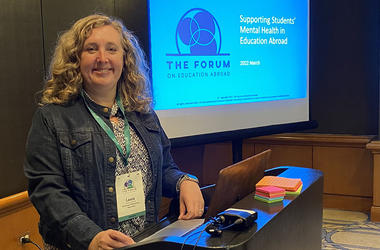
Promoting mental health during study abroad
Posted: October 5, 2023About one-third of college students in the U.S. have a mental health condition. The challenges of studying abroad and living interculturally can exacerbate the symptoms of some conditions such as depression, anxiety, or eating disorders, or prompt the development of new symptoms and conditions, according to Laura Dupont-Jarrett, Ph.D., L.P., a licensed psychologist and the University of Minnesota’s assistant director for education abroad mental health. She tells faculty and staff who are leading programs abroad to expect that up to 50 percent of students on a program could face mental health challenges and need some degree of support.
Dupont-Jarrett’s job is to prepare program leaders and on-site staff to help students, who can feel overwhelmed by loneliness or anxiety, given the many changes that come with living abroad. She says one key is getting students to intentionally think about how they will care for their mental health and wellbeing — before they even get on a plane.
“Students want to go abroad and have a great experience,” Dupont-Jarrett said. “And sometimes they tend to be optimistic, not realistic, in thinking that their mental health challenges here in the U.S. will somehow go away when they’re abroad.”
Since study abroad reopened after the COVID-19 pandemic, the University of Minnesota has seen a sharp increase in the number of students abroad needing mental health support. Some even decide they need to return home just days after arriving.
“Our ability to adapt to a new culture is not instant,” Dupont-Jarrett said. “It takes weeks, months, years to really become skilled at functioning in a new culture. But sometimes students decide almost immediately that it’s too much, and abandon their plans. That’s painful to witness, as we know that if we were able to provide them with support, they’d likely be able to make it through the initial shock.”
Helping students advocate for their mental health
Despite the challenges, Dupont-Jarrett is optimistic about the impact the University is having in supporting students’ mental health abroad.
“We have really caring staff at all of our sites abroad,” she said. “And our staff here at our education abroad offices are working with students to do a lot of planning and to advocate for what they need.”

One way staff are encouraging students to be proactive is by using the Self-Care Plan mobile app, created by Dupont-Jarrett last year with help from developers at the Global Programs and Strategy Alliance. The app guides students in thinking about stressors in their lives and their coping methods, and to recognize when their body signals they need to focus more on their wellbeing.
Dupont-Jarrett stresses that having a mental health condition does not mean a student cannot go abroad.
“Students should know that experiencing the world and experiencing cultures different from their usual culture is going to be amazing and life-changing,” she said. “At the same time, it’s going to be really stressful. They just need to plan for the treatment they’ll need abroad, such as therapy or medication, and stay really attentive to their wellness, as they would for any physical health conditions.”
She likens it to running a marathon.
“Everyone knows if you’ve never run a marathon before, it’s going to take a lot of physical preparation to do it well and to complete it, but they may not fully appreciate and train for the mental and emotional endurance needed as well,” she said.
It’s the same for study abroad, according to Dupont-Jarrett. Students think of all the logistical things they need to do, like get their passport and plane tickets, and then about what their apartment will be like or what classes they’ll take. But they often don’t prepare for the mental and emotional challenges, and they don’t reach out for help until they become distressed.
Some students have shared that being responsible for their mental health abroad, and participating in counseling in another country, was very empowering. They learn that if they can thrive under the intercultural challenges, they have the resilience for many other future situations.
Supporting faculty and staff

Dupont-Jarrett offers training and creates resources for staff and faculty who are leading education abroad programs to help them understand what mental health looks like for students today, how they can proactively support student wellness, and what to do if a student is distressed and in need of professional help. She also consults on emerging, critical situations.
The University of Minnesota may be the only institution with a position like Dupont-Jarrett’s, the result of a partnership between the Global Programs and Strategy Alliance, Learning Abroad Center, Carlson Global Institute, and Office for Student Affairs.
“This is a really novel approach, offering ongoing, embedded support, resources, and consultation about specific situations,” Dupont-Jarrett said. ”It is really huge that the University is saying student mental health abroad matters this much.”
Faculty and staff are eager to learn, according to Dupont-Jarrett, and programs are changing to be more proactive about supporting student mental health. For example, on-site staff used to only provide contact information for a local therapist when a student said they were struggling. Now, almost all sites are giving out that information to all students at orientation, right after they arrive. Many sites are also incorporating wellness elements by offering meditation groups or hosting walks in nature.
“So many people these days really want to support student mental health,” Dupont-Jarrett said. “Now we’re just trying to get information and coaching to people and making sure everybody at the University can help support students, holistically.”
 Global
Global